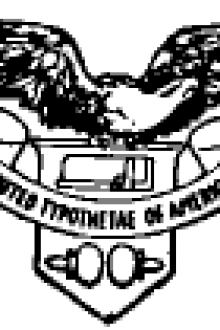author - "Frederick W. Hamilton"

ssity. Ordinary writing needs some use of commas to indicate the sense and to prevent ambiguity.
Always remember that the real business of the comma is just that of helping the meaning of the words and of preventing ambiguity by showing clearly the separation and connection of words and phrases. If there is possibility of misunderstanding without a comma, put one in. If the words tell their story beyond possibility of misunderstanding without a comma, there is no reason for its use. This rule will serve as a fairly dependable guide in the absence of any well recognized rule for a particular case, or where doubt exists as to the application of a rule.
Reversed, and usually in pairs, commas mark the beginning of a quotation.
In numerical statements the comma separates Arabic figures by triplets in classes of hundreds: $5,276,492.72.
In tabular work reversed commas are used as a sign for ditto.
SCHOOLS TEACHING PRINTING
Boston: Boston Typothetæ School of Printing.

pared. They are good, better, best, and bad, worse, worst. In spite of the fact that these adjectives are among the most common in use and their comparison may be supposed to be known by everybody, one often hears the expressions gooder, goodest, more better, bestest, bader, badest, worser, and worsest. Needless to say, these expressions are without excuse except that worser is sometimes found in old English.
Illiterate people sometimes try to make their speech more forceful by combining the two methods of comparison in such expressions as more prettier, most splendidest. Such compounds should never be used.
Some adjectives are not compared. They are easily identified by their meaning. They indicate some quality which is of such a nature that it must be possessed fully or not at all, yearly, double, all. Some adjective

ssity. Ordinary writing needs some use of commas to indicate the sense and to prevent ambiguity.
Always remember that the real business of the comma is just that of helping the meaning of the words and of preventing ambiguity by showing clearly the separation and connection of words and phrases. If there is possibility of misunderstanding without a comma, put one in. If the words tell their story beyond possibility of misunderstanding without a comma, there is no reason for its use. This rule will serve as a fairly dependable guide in the absence of any well recognized rule for a particular case, or where doubt exists as to the application of a rule.
Reversed, and usually in pairs, commas mark the beginning of a quotation.
In numerical statements the comma separates Arabic figures by triplets in classes of hundreds: $5,276,492.72.
In tabular work reversed commas are used as a sign for ditto.
SCHOOLS TEACHING PRINTING
Boston: Boston Typothetæ School of Printing.

pared. They are good, better, best, and bad, worse, worst. In spite of the fact that these adjectives are among the most common in use and their comparison may be supposed to be known by everybody, one often hears the expressions gooder, goodest, more better, bestest, bader, badest, worser, and worsest. Needless to say, these expressions are without excuse except that worser is sometimes found in old English.
Illiterate people sometimes try to make their speech more forceful by combining the two methods of comparison in such expressions as more prettier, most splendidest. Such compounds should never be used.
Some adjectives are not compared. They are easily identified by their meaning. They indicate some quality which is of such a nature that it must be possessed fully or not at all, yearly, double, all. Some adjective